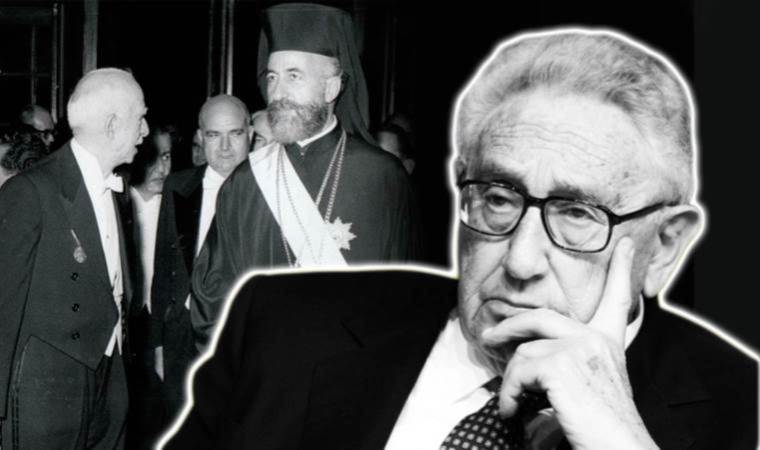Kissinger's report card: He had preferred Turkey over Greece
Former U.S. Secretary of State Henry Kissinger, a prominent diplomat during the Cold War, passed away at 100 on November 29. He was known for ending the Vietnam War, normalizing relations with China and the Soviet Union, and playing a key role in the 1974 Cyprus crisis.

Kissinger served as National Security Advisor (1969-1975) and Secretary of State (1973-1977) under Presidents Richard Nixon and Gerald Ford.
During his tenure, Henry Kissinger played a key role in shaping American foreign policy as a primary decision-maker on major diplomatic issues. The former bureaucrat, known for his negotiation-based approach, achieved significant successes, including ending the Vietnam War and reducing tensions with the USSR and China.
A fervent advocate of the "American Century" ideal, he viewed Turkey as a key country for American interests due to its strategic location. He favored Turkey over Greece, focusing on the Cyprus dispute and opium production. His policies toward Turkey laid the groundwork for Turkey's military intervention in Cyprus following the 1974 coup against Makarios.
Here are some highlights from Kissinger's life:
Became a citizen at 20
Born on May 27, 1923, in Fürth, Bavaria, Germany, Henry Alfred Kissinger fled Nazi Germany with his family in 1938, settling in New York. He became a U.S. citizen in 1943 at age 20.
He graduated summa cum laude from Harvard College in 1950. He then completed his Master of Arts in 1951 and his Doctor of Philosophy in 1954 at Harvard University, respectively.
During his tenure, he played a key role in several major events, including detente with the Soviet Union, re-establishing relations with the People's Republic of China, ending the Yom Kippur War through shuttle diplomacy, and negotiating the Paris Peace Accords to end U.S. involvement in the Vietnam War.
Praise from China
After leaving government, he founded Kissinger Associates, an international geopolitical consulting firm, and wrote over a dozen books on diplomacy and international relations.
Kissinger's legacy in American politics is controversial. Academics have recognized him as an effective Secretary of State who supported the pragmatic policy approach of "Realpolitik" but criticized him for turning a blind eye to war crimes committed by American allies.
He received the controversial 1973 Nobel Peace Prize for negotiating a ceasefire in Vietnam. In contrast, he is highly regarded in China, where the China News Service described him as deeply understanding world affairs and possessing a sharp vision.
Kissinger, as a significant figure in U.S. foreign policy, played crucial roles in several events related to Turkey. His views on Turkey's geopolitical importance highlight the strategic value of its position in international relations.
Here are some key interactions and points about Turkey's geopolitical importance from Kissinger's perspective:
Cyprus Peace Operation (1974)
The year 1974 was one of the most critical periods of the 20th century, overshadowed by the Cold War. Kissinger's policies as U.S. Secretary of State during this period hold significant importance in the history of international relations. Notably, his approach during the Cyprus War and U.S. policy towards Turkey during the conflict reflects the complexity and strategic calculations of his foreign policy understanding.
The Cyprus War began with a coup by the Greek junta on the island on July 15, 1974, aiming for Enosis, unification with Greece. However, this move led to a severe reaction from Turkey. On July 20, 1974, Turkey launched a Peace Operation to end massacres against the Turkish community on the island. Kissinger covertly supported this operation, making it a cornerstone of U.S. foreign policy during his tenure.
While the U.S. under Kissinger tried to maintain a balanced policy between Turkey and Greece, he often sided with Turkey. He valued NATO's southern flank's protection and establishing a strategic balance against the Soviet threat. In this context, Turkey's geopolitical position weighed heavily in Kissinger's political calculations.
The U.S. policy during this period was shaped by the realpolitik of the Cold War. Kissinger wanted Turkey's role in NATO to remain strong. Thus, his support for Turkey during the Cyprus War can be considered part of the U.S.'s overall foreign policy strategy.
Turkey and NATO
During the Cold War, Turkey's membership in NATO was strategically important, especially due to its proximity to the Soviet Union. Kissinger worked to strengthen Turkey's role in NATO and often emphasized its importance within the Western alliance.
Kissinger promoted diplomatic and military cooperation between Turkey and the U.S., defended strengthening relations between the two countries, frequently highlighted Turkey's geopolitical position, and noted its vital importance for U.S. global strategies.
